On April 21, 1967, a military coup took place in Greece, as a result of which three people came to power, remaining in history as the “junta of black colonels.”
Three homely little Napoleons became the main tools of an extensive plan called “Prometheus”, designed to stop the danger of a communist takeover in Greece and the spread of communist infection in the country.
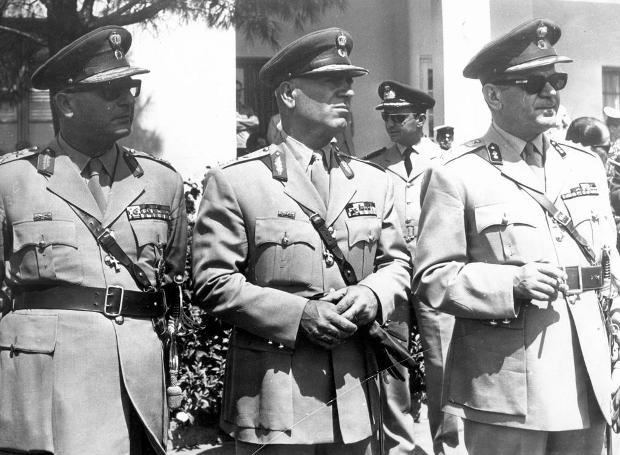
Brigadier General, head of the tank forces training center Stylianos Pattakos and artillery colonels Georgios Papadopoulos and Nikolaos Markarezos.
Many years later, leafing through documents of that time, historians discovered the bitter truth: the coup would have happened anyway. Not specific colonels, but others. Greece, one way or another, was doomed to enter once again into the narrow and dark tunnel of civil strife.
A lot of evidence and memories can be brought into the story of the seven-year period of the dictatorship of black colonels in Greece, but the result will be more emotional than historical. There are very few documents about this period; archives – both Greek and foreign – are just beginning to be opened.
There is no single view on the events of forty-five years ago and, probably, there cannot be: the heroes of those distant events are still alive and well – both negative and positive. And the very division of them into negative and positive is also very, very conditional. Except, of course, in clearly egregious cases. Like, for example, the three “Napoleons” already mentioned above and the well-known stories of their henchmen who took a direct part in the torture and murder of political prisoners.
We cannot ignore the fact that, after forty-five years, the assessment of the role of the junta in Greece is far from clear. The order (albeit reinforced by tank muzzles) that reigned in dictatorial Greece is remembered by many with nostalgia. Especially today, during the economic crisis, when it comes to the next political scandal, a sharp jump in crime, the vulnerability of citizens not only from criminal elements, who, perhaps, are the only ones who live freely, but also from the arbitrariness of the statesmen themselves, ruling on behalf of democracy.
One cannot help but remember that the coup occurred relatively easily. There was no resistance offered. The few citizens who found themselves on the streets of Athens in the early morning of Friday, April 21, watched in bewilderment as the tanks advanced towards the center, towards the royal palace, towards the central building of the telephone exchange, towards the radio station building in Zappion Park. For some reason the kiosks were closed, and near their dark cubes lay stacks of morning newspapers tied with twine. More precisely, those who managed to leave the printing house.
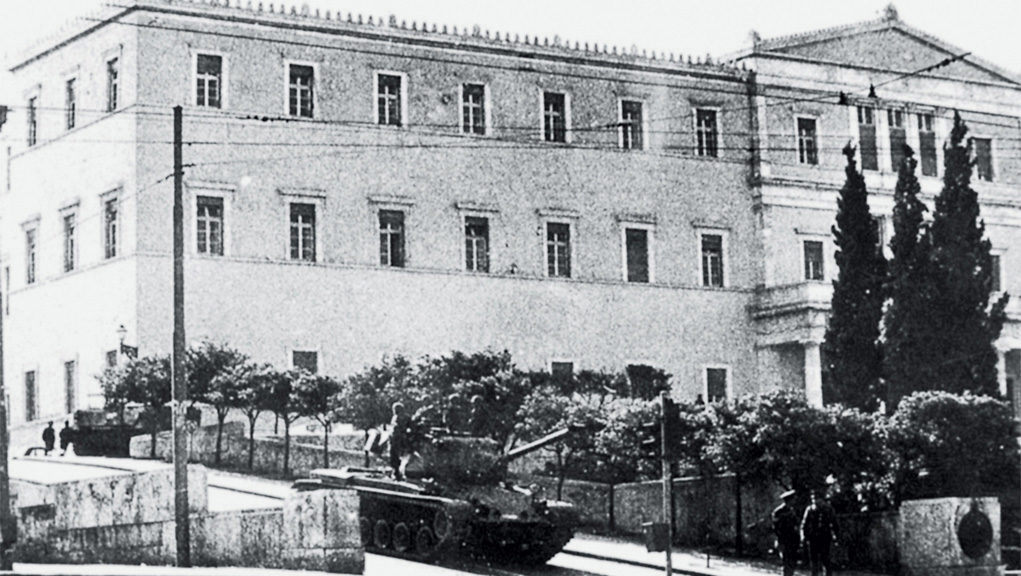
Putschist tanks at the Greek Parliament
By 2 o'clock the entire political leadership of the country was arrested. On Xenokratous Street, where the apartment of the country's Prime Minister Panagiotis Kanellopoulos was located, military personnel were on duty, not allowing anyone, not even correspondents from central newspapers, to approach the doors of the house. When the military entered Kanellopoulos’s apartment to arrest the prime minister, his wife was scared to death, thinking that it was communists dressed in military uniform who had come for her husband’s scalp.
At 2.30, the tanks already controlled the entire center of the capital, a quarter of an hour later the city telephones stopped working, and worried citizens, trying to call the newspaper editorial offices to find out what was happening in the city, looked in amazement at the suddenly deafened and numb telephone receivers.
At 3.30 it became clear that Athens was in the hands of the military. The military broke into the house of Manolis Glezos, who at that time ran the left-wing newspaper Avgi. He came out to them in his pajamas and saw one of the midnight guests tearing out the telephone wire with meat. Manolis Glezos was taken away in his pajamas, without even allowing him to change his clothes. At the same time, Andreas Papandreou and Leonidas Kirkos were arrested in their apartments. One of them will be destined to become the head of the socialist party PASOK, which he created, the other – to head the Internal Party of Communists (KP Esoteriku, if anyone else remembers that name).
At 5.30 in the morning, the colonels were already climbing onto the porch of the royal summer palace in Tatoi, where the royal family was resting. They demanded that the then 27-year-old King Constantine II recognize the junta. Constantine compromised, against the advice of the already arrested Panagiotis Kanellopoulos. The colonels did not take the king by surprise. He had not slept since half past three in the morning, when he was awakened by an alarming call from retired admiral Athanasius Spanidis, who called him from the naval base located on Salamis. He asked the king to give the order to call a military squadron from Crete in order to suppress the military coup and return the legitimate government to parliament. Next came a call from the Minister of Public Order, Georgios Rallis. He called from the police station in Marusi and also insisted on urgently calling the air force from the province, that is, those military units that were not influenced by the colonels who started the coup.
It is difficult to say why the king listened to Spyros Markezinis, the head of the conservative party, and cooperated with the junta. Probably Konstantin decided that in this way he was choosing the lesser of two evils. They even say that on that historic morning the king addressed the dictators with the following words: “I am sure that you did this in order to save the country.” Five days later, on April 26, in his speech in honor of the new regime, Constantine went even further, declaring, among other things: “I am confident that with God’s help, with my support and the support of all the people, in the very near future you will create a state of justice, a truly healthy democratic state.”
On the very first day of the creation of the “state of justice,” about 10 thousand people were arrested and placed at the hippodrome in Paleo Faliro. And after some time, on barges of the navy of the new “healthy democratic state”, more than 7.5 thousand people were transported to exile camps on the islands of Yaros and Leros, which again “hospitably” opened their gates.

Golden phoenix, symbol of the Greek junta
The golden Phoenix bird, which became the emblem of the junta of black colonels, later known as the “bird,” was reborn from the ashes. The gates of concentration camps abandoned since the cleansing of the Civil War opened and accepted new residents, progressive mouths were hermetically slammed shut, and newspapers that smacked of centrism (not to mention leftism) were closed.
The first dead appeared immediately. The very first, on April 21, was killed by the young Athenian Maria Kalavra, who refused to obey the order of the military man. Four days later, servants of the “state of justice” killed Panagiotis Elis, who became the first sacrificial “lamb” of the new regime in historiography, right at the hippodrome. Almost no information has been preserved about Panagiotis Elis. It is only known that he was born in the year of the Asia Minor catastrophe, in 1922, in Komotini, he fought, was captured and exiled to hard labor, first in Bulgaria and then in Serbia. When he returned to Greece after his liberation, his grateful homeland exiled him, as a communist, to an honorable exile on the island of Makronisos. Not yet suspecting that the golden-winged bird Phoenix had returned to Greece, Alice carelessly protested against his forced detention. One of Phoenix's “chicks”, an armed guard of the new order, hit him on the head with a rifle butt, killing him on the spot.
The Phoenix bird could kill you with one blow of its clawed paw, or it could borrow some of its golden shine. This brilliance blinded many people, and among them, unfortunately, there are quite a few cultural figures who not only outlived the black colonels, but also lived in glory and people's love to a ripe old age. Some of them continue to thrive to this day and enjoy popularity.
Thus, in the festive concert dedicated to the anniversary of the “April Revolution”, as the junta called itself, organized on April 28, 1968 at the Panathenaic Stadium, many then and subsequently famous artists took part. Among those who conducted the radio broadcast orchestra was, for example, Yorgos Katsaros, Marinella, Rena Vlahopoulou and Grigoris Bitikotis, then called “Sir Biti”, sang for the dictators, Vicky Mosholou, Jeni Vanou, Yorgos Zambetas, funny skits were performed by the favorite actors of Greek cinema – Dinos Iliopoulos, Kostas Voutsas, Yiannis Voyazis and others.
Konstantinos Plevris, the ideologist of the Golden Phoenix regime, and now the acting theoretician and ideologist of the Popular Orthodox Front, that is, the LAOS party of Giorgos Karadzaferis, wrote and spoke a lot about the need for a “cultural revolution” inspired by the “April Revolution”. And it is here that I would like to repeat what was already said at the beginning. About what really happened during the dark period that began on April 21, 1967 and ended ingloriously.
On July 24, 1974, with the arrival in Athens from Paris of Konstantinos Karamanlis, called to save the nation, there was very, very little reliable information.. And how should it be? If Konstantinos Mitsotakis continues to be considered the “Methuselah” of Greek politics, if the former king Constantine not only comes to Greece as his patrimony, but also auctions off its treasures, if the beloved bard of the Golden Phoenix “Sir Biti” is honored almost more than Mikis Theodorakis, persecuted by the junta? The most interesting evidence was provided a year ago by the editor-in-chief of the Vima newspaper, Stavros Psycharis, in his article “The Hole.”
Several years ago, when Kostis Stephanopoulos was still president of the country, former King Constantine II visited Greece. Kostis Stephanopoulos gave his consent for Constantine to visit the presidential palace where he once lived, first as heir to his father, King Paul, and then as King of Greece. Entering the president's office, the former king sighed: this room was once his office, until the very day when he was forced to leave the country after an unsuccessful attempt to overthrow the dictatorial regime.

The entire royal army. King of Hellas Konstantinos ΙΙ / Far left G. Papadopoulos
Then Konstantin’s gaze stopped at some point in the wall of the office. “I’d like to see if there’s still a hole there,” exclaimed the former king and, catching the president’s surprised look in response, hastened to explain that the hole in the wall led to the palace listening and tape recording system. The recording of palace conversations began after the events of July 1965, which ended with the defection of some prominent members of the ruling Union of Center party, including Konstantinos Mitsotakis.
It goes without saying that no magnetic recordings were found in the hole, no matter how hard we searched. What does this mean? That someone who knew about their existence hastened to get rid of dangerous evidence. Indeed, the hole in the presidential palace could shed a lot of light on the black holes of modern Greek history.

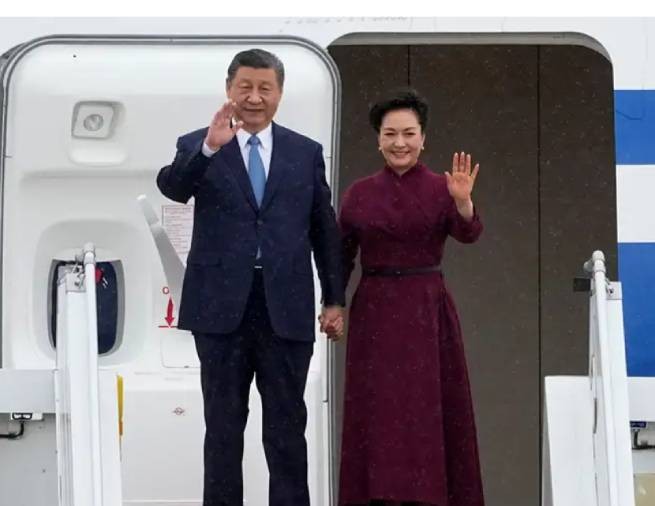

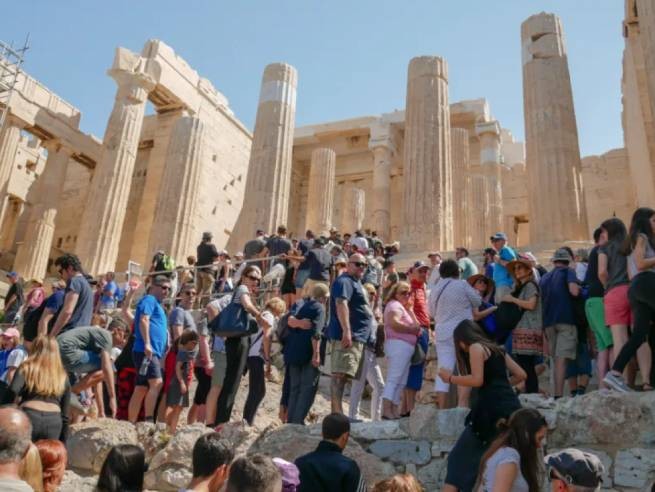
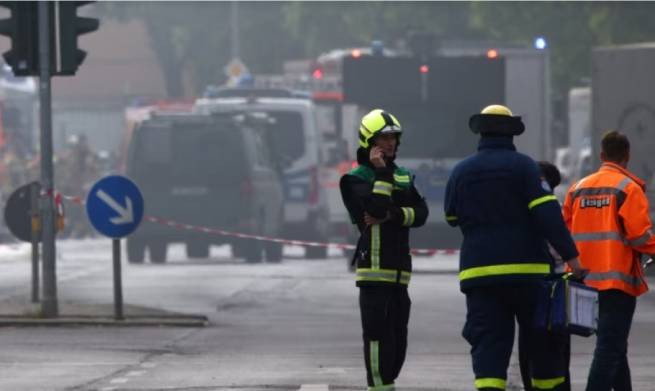
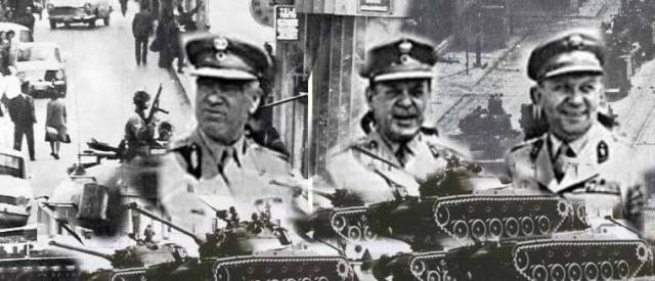

More Stories
On this day, Koukidis sacrificed himself to stop the Nazis from desecrating the Greek flag.
On April 10, 1821, the Turks hanged Patriarch Gregory V at the Phanar gates
How did married couples divorce in Ancient Greece? Difference with modern divorces